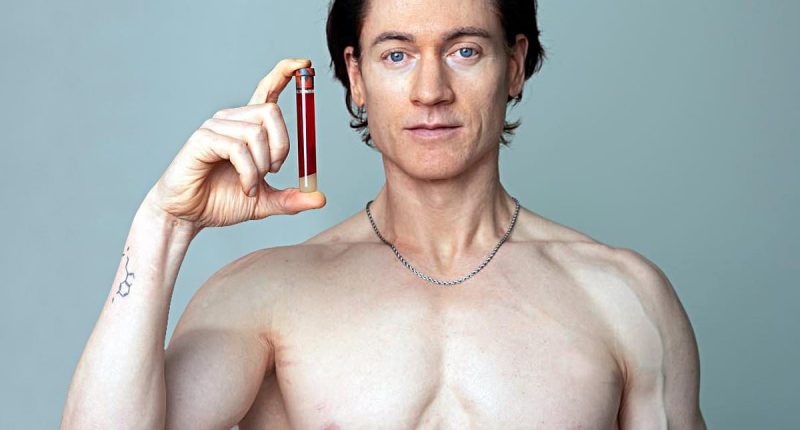Share this @internewscast.com
A supplement beloved by Bryan Johnson and other biohackers for its age-defying properties might be flawed, new research reveals.
Previous animal studies have suggested taurine, an essential amino acid that supports immune health and nervous system function, declines with age.
It’s found naturally in the body, in various high-protein foods, and it is also added to energy drinks for its potential to enhance mental and athletic performance.
It was thought that replenishing it by taking supplements could keep the body young by protecting against damage to DNA and cells.
Off the back of the research in 2023, taurine was quickly picked up by those looking to fight the effects of aging and Johnson became one of its proponents, with it added to his daily roster of supplements.
But scientists behind a new study claim taurine doesn’t actually decline with age; instead it either increases or stays stable and can vary wildly from person to person.
Therefore, the amino acid is not a good indicator of age-related changes as originally thought, and taking a taurine supplement may have no effect whatsoever on a person’s longevity.
What’s more, other studies have shown high doses or prolonged taurine intake can actually cause a variety of side effects, including gastrointestinal discomfort, kidney strain, and in rare cases, liver pain or even leukemia.

A supplement beloved by Bryan Johnson and other biohackers for its age-defying properties might be flawed, new research reveals
The human body uses taurine for actions in cells, such as energy production, and helps the body process bile acid and balance fluids, salts and minerals.
The amino acid also has important functions in the heart and the brain and helps support nerve growth.
There are no current recommendations on how much taurine a person should consume or what adequate levels are in the body. However, lower levels have been associated with an overactive thyroid, vision impairment and kidney dysfunction.
It may benefit people with heart failure and prevent their condition from worsening by lowering blood pressure and calming the nervous system.
It has antioxidant and anti-inflammatory properties and has been studied for its role in energy production and improving exercise performance.
Commenting on the findings of the new study, Joseph Baur, a professor of physiology at the University of Pennsylvania, told Live Science: ‘The main takeaway is that a decline in taurine is not a universal feature of aging.’
Scientists analyzed data from both humans and animals.
Included in the research were 1,000 people aged 20 to 100 years old who had participated in several studies from around the world.
In animals, the team analyzed blood from rhesus macaque monkeys ages three to 32 and blood from lab mice ages nine to 27 months old.

Along with supplements, foods rich in taurine include shellfish, turkey, chicken and seaweed. It is also a common ingredient in energy drinks (stock photo)
What surprised the researchers is that over time, taurine levels actually increased with age.
Thus, study co-author Maria Emilia Fernandez, a postdoctoral fellow at the National Institute on Aging, said taurine is ‘unlikely to serve as a good biomarker of aging’.
Meanwhile Rafael de Cabo, chief of the Translational Gerontology Branch at the National Institute on Aging who was another co-author of the study, added: ‘It’s not a reliable biomarker of anything yet.
‘I think that we need to be digging into the basic mechanisms… before it can be used reliably as a marker.’
Vijay Yadav, an associate professor at Rutgers New Jersey Medical School who co-authored the 2023 taurine study, is currently taking part in an ongoing clinical trial to see if it could have any effect on aging in middle-aged humans.













